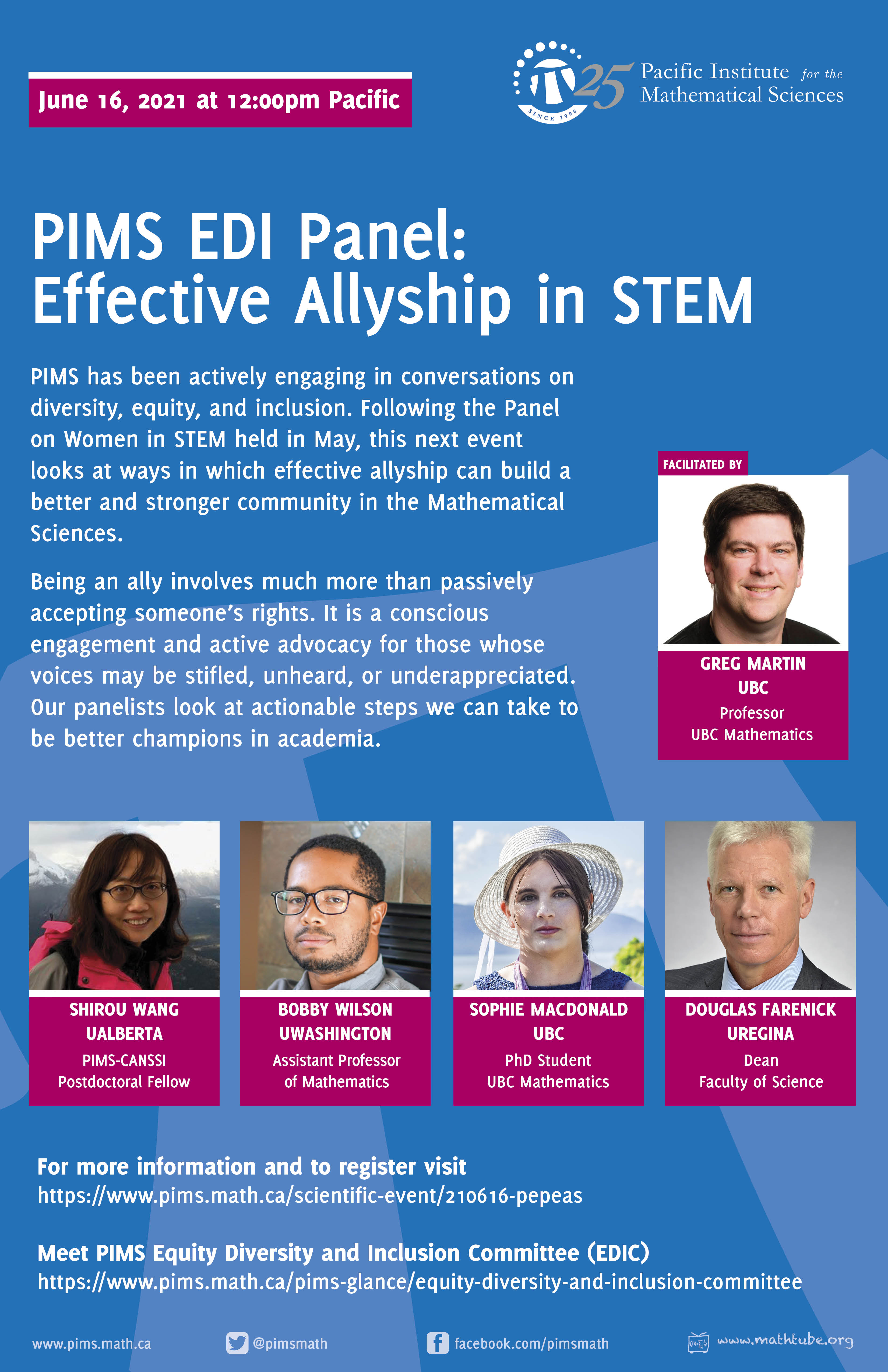PIMS EDI Panel: Effective Allyship in STEM
Details
In recent months, PIMS has been actively engaging in conversations on diversity, equity, and inclusion. Following the Panel on Women in STEM held in May, this next event looks at ways in which effective allyship can build a better and stronger community in the Mathematical Sciences. Being an ally involves much more than passively accepting someone's rights. It is a conscious engagement and active advocacy for those whose voices may be stifled, unheard, or underappreciated. Our panelists look at actionable steps we can take to be better champions in academia.
Panelists:
Sophie MacDonald, University of British Columbia
Sophie is a PhD student in the UBC Mathematics Department, and a settler on Musqueam land. She grew up between the Nottawasaga and Severn (Matchedash) Rivers, on the ancestral land of the Mississauga (Ojibwe/Anishinaabe) and Wendat (Huron) people. Her undergraduate studies were at McMaster, on land that has been inhabited for 10,000 years.
Sophie's research concerns discrete dynamical systems. She has been a TA in the Math Department and the Master of Data Science program and has served on UBC's Trans, Two-Spirit, and Gender Diversity Task Force. As an undergraduate, she edited the Canadian Mathematical Society student newsletter, Notes from the Margin. Currently, she facilitates training and professional development for graduate students, both in the Math Department and at UBC's Center for Teaching, Learning, and Technology. Outside of her academic work, Sophie enjoys playing guitar and exploring ways to engage in fitness while trans.
Shirou Wang, University of Alberta
Shirou Wang is a PIMS-CANSSI postdoctoral fellow at the University of Alberta. She obtained her Ph.D. from Peking University in 2016 and has held a postdoctoral position at the Chinese Academy of Sciences. Her research interest lies in dynamical systems, concerning areas such as random and stochastic dynamics, data-driven computation, ergodic theory, and applications to biological, mechanical, and physical systems. One of her particular research interests is the application of dynamical system theory in data science. Shirou has been actively visiting and working with various research groups with diversified interests including the University of Washington and the University of Massachusetts-Amherst. In particular, she has presented 12 invited conference talks and 16 seminar talks at Universities in the United States, Canada, and China. Beyond mathematics, Shirou is a lover of classical music and opera, and enjoys all kinds of outdoor sports especially tennis and skiing.
Bobby Wilson, University of Washington
Bobby Wilson is an Assistant Professor at the University of Washington. Before taking on this position he was a CLE Moore Instructor at MIT from 2015-2018. Wilson obtained his Ph.D. at the University of Chicago in 2015 under the supervision of Professor Wilhelm Schlag. He was twice an MSRI Postdoctoral Fellow (New Challenges in PDE and Harmonic Analysis). His research has been primarily concerned with questions concerning the structure theory of measures and the dynamics of dispersive evolutionary equations.
In 2020 he was one of the recipients of the Karen EDGE Fellowships; was featured on the website Mathematically Gifted and Black; and was on the list of 1000 Inspiring Black Scientists in America. Prof. Wilson also serves on the Scientific Committee of the 2022 Pacific Rim Mathematical Association (PRIMA) Congress.
Douglas Farenick, University of Regina
Douglas Farenick is currently the Dean,Faculty of Science at the University of Regina. His professional leadership roles have included Vice President (West) of the Canadian Mathematical Society (CMS) and Chair of the Finance Committee of the CMS. Dr. Farenick is currently President of the Canadian Council of Deans of Science, serves on the Board of the Pacific Institute for the Mathematical Sciences, and represents the University of Regina on the TRIUMF Members Council. Dr. Farenick’s mathematical expertise is in the areas of operator algebra theory, operators on Hilbert space, noncommutative convexity, quantum information theory, and the theory of operator systems. He has published two books (Springer) and more than 50 peer-reviewed research articles.
Dr. Farenick has enjoyed continuous support from the NSERC Discovery Grant program throughout the entirety of his career. He has taught mathematics at all undergraduate and graduate levels, and ranks the teaching of a three-week intensive graduate course at the African Institute for Mathematical Science in Kigali, Rwanda, as a high point in his teaching career. He continues to be inspired by the students and colleagues he works with locally and abroad. In his spare time, he enjoys swimming and cycling.
Greg Martin, University of British Columbia
Greg Martin (he/him) is a professor in the Department of Mathematics at the University of British Columbia in Vancouver. His research is in analytic number theory, with a focus on comparative theory ("prime number races") and on multiplicative problems from the classical tradition. He received his BSc from Stanford University and his MSc and Ph.D. from the University of Michigan and held postdoctoral positions at the Institute for Advanced Study and the University of Toronto before coming to UBC. He is a two-time winner of the MAA's Lester R. Ford Prize for expository writing and a winner of a UBC Faculty of Science Killam Teaching Prize. He is currently the Chair of the UBC Mathematics Department's Equity Committee.
Organizers:
